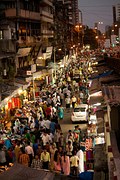Smart Cities: A Smart Solution?

Introduction
It is an embarrassing fact that India has become a land of disparities—for one can see dismal, tumbledown houses—enmeshed in the chains of poverty, being shadowed by intimidating skyscrapers—the very epitomes of luxury and wealth. The contrast is becoming starker by the day; therefore, now is the time to revamp the infrastructure of our nation, and to control the uncontrolled, unplanned rate of urbanisation that is taking place. Poor city and urban planning has thrown the rate of urbanization into turmoil; this has subsequently had numerous repercussions on the health and well-being of the residents of these haphazard localities. As said by Quartz India, “India is rising. In cities across the nation, the pace of construction is reaching frenzied heights. Each city, each district, each state is reinventing itself: one smartphone, one flyover, one superhighway, one mega-project at a time”.
According to a proposal initiated by the Prime Minister Narendra Modi, local governments are to communicate with the citizens of Indian towns and cities, in order to come up with proposals to make their cities smart. This contains an extensive list of twenty cities that has already drawn up. Reported by the Economic Times, “Prime Minister Narendra Modi has said the nation needs to think big and focus on skill, scale and speed to revive India’s growth story.”
Smart Cities
But what are smart cities? This is a term that is widely heard, and yet rarely understood in certainty. As defined by the Business Dictionary, a smart city is “a developed urban area that creates sustainable economic development and high quality of life by excelling in multiple key areas: economy, mobility, environment, people, living, and government.” However, in India, the prime aim of a smart city is to ensure that the citizens are guaranteed potable and clean drinking water, sanitation, effective public transport, affordable housing, health and education, and reliable electrical services. In the words of Narendra Modi, “Cities in the past were built on river-banks. They are now built along highways. But in future, they will be built based on availability of optical fibre networks and next-generation infrastructure.” So basically, smart cities grow at a controlled and planned rate—such that they can utilise the available resources to their full potential.
Advantages of Smart Cities
Modi’s proposition to develop smart cities has a myriad of advantages associated with it—in addition to opportunities that support initiating a positive, social change. Smart cities enable economic growth and development, have a high market viability, and aid in the provision of technological platforms. As reported by The Hindu, “They benefit everybody, including citizens, businesses, the government and the environment”. Furthermore, stated by the Indian Express, the development of smart cities improves the governance of the region, improves the safety of the city, and altogether gives that area an identity based on its prime source of economic income. Truly, if the establishment of smart cities is successful, it will improve the growth and economy of India by leaps and bounds.
Challenges
However, the establishment of smart cities also poses several challenges; as said by The Hindu, “the success of such a city depends on residents, entrepreneurs and visitors becoming actively involved in energy saving and implementation of new technologies”. So, the creation of a smart city is truly dependent on the mindset of the people involved. Moreover, as reported by Quartz India, “attracting investment to fund smart city transformations is a major challenge”. It is no secret that a vast amount of money will have to be invested to develop a smart city. So, public-private partnerships will have to be created in order to fund the many developments associated with smart cities—but at a heavy price: the terms of these partnerships often bypass the democratic processes associated with planning and governance.
Conclusion
That said, despite the challenges and disadvantages, this proposal by Modi is definitely one that has the potential to alleviate the problems associated with poverty, and infrastructural disparities in Indian cities. And although the establishment of smart cities may seem like an almost futuristic, nearly impossible venture to undertake, this proposal can undoubtedly be made a reality as long as the citizens of cities harmoniously collaborate with their city officials: they must aim to ameliorate the quality of living in all aspects.
[Image Attribute: PDPics]




